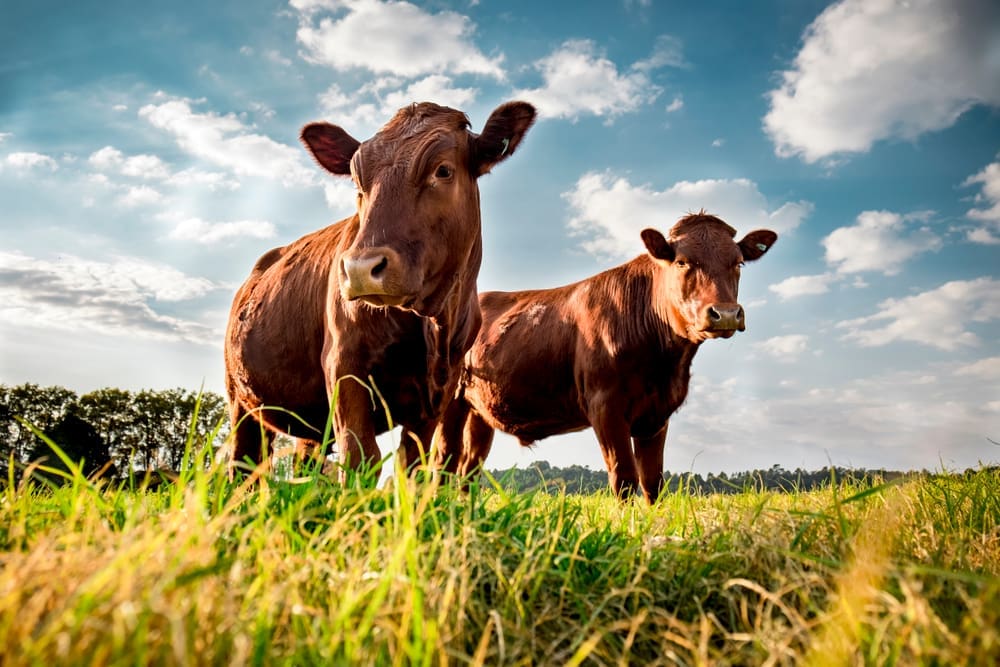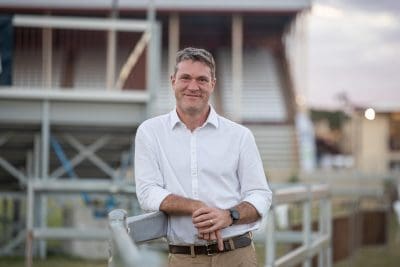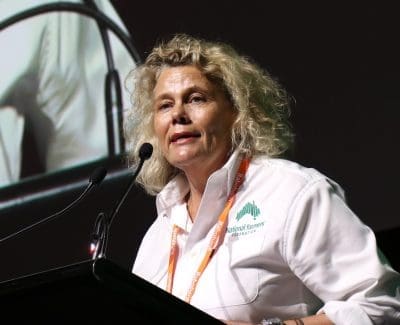
AS AGRICULTURE looks to fall into line with companies and countries making big commitments to reduce their environmental footprint, creating a label to reflect the Australian beef industry’s credentials has become a topic of debate.
Sustainability claims have already started, with more than five Australian beef brands selling carbon neutral items and others committing to concepts like regenerative agriculture.
While many are looking to give themselves a marketing edge at this point, the situation could be different as target deadlines near and more beef is complying with sustainability demands like carbon neutral.

Angus Gidley-Baird
Standardised labelling was brought up by a Northern New South Wales processor earlier this month and the president of the Global Roundtable for Sustainable Beef last week said climate claims will be critical to attract millennials.
Rabobank senior animal protein analyst Angus Gidley-Baird said sustainability claims were starting to appear on products and credibility was a critical factor to keeping their brand reputation.
“If all the products lined up in a shop have different sustainability labels on them, we run the risk of confusing the consumer,” Mr Gidley-Baird said.
“But if there is standardised label, then it will send a better message to the consumers. A label would need to be backed by a good integrity system, something that may even stretch some producers to comply.
“There is definitely a need for it and possibly one of the representative organisations needs to do it, I’m just not sure who will be the one to jump first.”
Mr Gidley-Baird said there could be market implications for the beef industry in the future if it did not have a standardised sustainability label.
“I think eventually it will become an issue of market access, particularly in some of the export markets,” he said.
“There may be opportunities for premiums for first movers but longer term I believe the market will normalise and not having anything may reduce market access opportunities.”
Producers looking at low carbon marketing
Producers further up the supply chain have also been looking into selling their sustainability credentials. Including NSW cattle marketing group Ebor Beef, which had about 200 people show up to its carbon focused conference last week.
President and producer Sophie Wright said a lot of producers in the New England area were starting soil carbon projects and looking at ways of reducing their emissions. She was doing a soil carbon project on her own property.
“People in the New England seem to be early adopters and a lot of them are looking into starting carbon projects – particularly with the rainfall it could be a big area for it,” Ms Wright said.
“There’s also lots of pockets in NSW and Victoria that have projects going as well.”
Ms Wright said conversations had started within the group about selling carbon neutral cattle.
“The conversations are preliminary at this point and we haven’t really taken it much further than that,” she said.
“But there seems to be demand from processors to have carbon neutral brands and if we have carbon neutral farms than it makes sense to try and sell those attributes. Regulation will be a hard one with carbon accounting and I can’t see producers buying credits to offset their emissions.”

Fiona Simson
NFF considering sustainability labels
With the calls for standardised sustainability labels coming from many sides of the industry, the National Farmers Federation is considering its options. The group is planning to release an agriculture-wide sustainability framework later this year.
President Fiona Simson said labelling could flow on from the release of the framework.
“Certification is place where national farmers have been heading for a while and that could evolve out of the Australian Agricultural Sustainability Framework,” Ms Simson said.
“It has to recognise the diversity of our production systems and be meaningful for every producer and commodity across Australia.”
Ms Simson said if the NFF was to become involve in certification and labelling, it would focus on the broad sustainability definition.
“The AASF will take in three elements of sustainability – people, profit and planet. So if we are going to develop a trademark it will need to take in all of those elements.”

We should assume that increasingly consumers will be conscious of the need to reduce the impact of meat production, along with all other food products, on the environment. The veganism arguments, which are based on cherry picking and failure to explore the impact of monoculture cropping, are getting more currency.
Any approach based on reductionism or fluctuating outcomes, such as ‘carbon farming’ are doomed to fail and even have negative environmental outcomes.
Any approach that is not based on certification easily identified with existing international standards is doomed to fail.
The impact of management on the environment is what we have to address. For example, the carbon issue is about farmers managing so that their enterprises are more rather than less likely to add carbon or reduce losses – the actual amounts are beyond their control because of natural influences such as bushfires and variable rainfall.
The NFF has a long way to go before its ‘framework’ looks like meeting these tests. The task for Australia is particularly hard because of its international pariah status iin the attempts to reduce world-wide global warming and deforestration.
“Sustainability” labeling all depend on the formula used to do the calculations. ALL beef is sustainable in terms of what sustainability actual means.
The late Rick Farley delighted in retelling a comment from an Englishman about Australia “I love the way Australians always do the right thing although it’s a pity they do everything else first”. Verification or certification of the otherwise hidden attributes of food and fibre must be one of the better illustrations of the Englishman’s observation.
There is much to be learnt from past mistakes and the causes of those mistakes. But rather than do that here I will list five desirable features of food and fibre certification systems.
• We need to ensure certifications and certification systems are attractive and credible as broadly as possible—to landholders, markets (domestic and export), consumers, communities, NGOs and governments.
• The actual certification needs to be restricted to credence attributes, that is desirable attributes not evident in the product or in the consumption of it. Obvious attributes include environmental impact, animal welfare and people management. The suggestion that the certification should include verification of profitability is, at best, muddled thinking. However, the certification system should deliver as many benefits as possible, including improved productivity and self-esteem.
• We need to avoid ecological fragmentation or reductionism wherein we have separate systems for carbon, for biodiversity, for water, for soil or for whatever. This will be most effectively achieved by concurrent consideration of the totality of the ecological systems rather than by adding ecological elements to narrowly conceived systems as is the current trend.
• We need to avoid product and product chain fragmentation. At least two-thirds by value of food and fibre are produced by at least two thirds of producers who operate two or more industries. For instance, why would we have beef only or cotton only systems when less than 15% by value of those products is produced on only beef or on only cotton farms respectively. Where desirable specific product related attributes can be added to broadly applicable systems.
• We need to avoid geographical fragmentation for agribusiness chains are generally national if not international. Where desirable regional attributes can be added to nationally applicable systems.
The time has come. Australian agriculture is at the brink of creating and presenting its sustainability credentials and perhaps lead the way globally in sustainable land management. Certified Land Management can deliver this. CLM is an arrangement of management for landholders devised by the ALM Group. It has been trialed and is ready for national application. It is applicable to all primary production properties and for each industry on every one of these – from the single enterprise vast cattle stations of the north to the diverse mixed farm operations across Australia.
We are told that ‘The Australian Agricultural Sustainability Framework will take in three elements of sustainability – people, profit and planet.’ Who can relate to the practical application of that? Land managing producers? No. Consumers? No. AASF needs to have its feet on the ground in pastures, in crops, in soil, and in waterways – and importantly down to property and paddock scale.
The management issue at the core of sustainability is for each land manager to identify their environmental impacts on that property and manage these on an ongoing basis. It is not so much about managing land and water as about managing the environmental impacts on land and water. There will be positive impacts and negative impacts. Delivery is done through localised workshops where locally specific information is exchanged and local catchment priorities are considered in developing the management plans that landholders individually produce for their operations. State Farm Organisations and Landcare Groups would have a prominent role in delivery.
Then the ongoing application of the management plan on that property is verified and certification applies to the products produced there. The certification is carried right along the value chain to consumers. The uptake must be voluntary to succeed but is encouraged by Government and assisted through the start-up.
This is the delivery process for sustainability that can work. It is applicable nationally and should be a national objective for sustainability. Give it a name, a brand? I’d go for LandConnect. This label would express and verify the landholders’ positive management of their land and it allows consumers to connect with that land in their purchase options.
I can add this quote in conclusion: Sustainability is not a destination – it is a journey.
The reality of the situation is that the Australian beef industry covers the vast majority of entire country. It spans people who have a couple of cows to enterprises with hundreds of thousands or more head. I do not know how many PIC’s there are, but I would not be surprised if it was well in excess of a hundred thousand.
The hard facts are with such a diverse and widespread industry that any sort of compulsory system can never be policed and for the most part will be ignored. There is already ample evidence in other areas that this is what would happen. Could you imagine what would happen if our own industry organisation started bankrupting producers for not doing something they never voted for.
If some niche markets want some sort of virtue signalling holistic sustainability assurance then those that choose to supply those markets pay the cost. I somehow do not think Vietnam or Indonesian consumers eating live exported Australian cattle are going to be caring too much about Australian cattle methane emissions.
Beware of people creating an issue to line their bank account with the money of others. I remember many years ago going to one of the beef expo seminars and according to the expert there, by now all our markets should have been taken by Argentina. The experts say we had to have LPA to keep our markets, yet here we are today trying to compete with the USA that has no such scheme. At the end of the day, the world wants beef, because it tastes so nice and Australian beef is already the best.
100% Agree Frank.